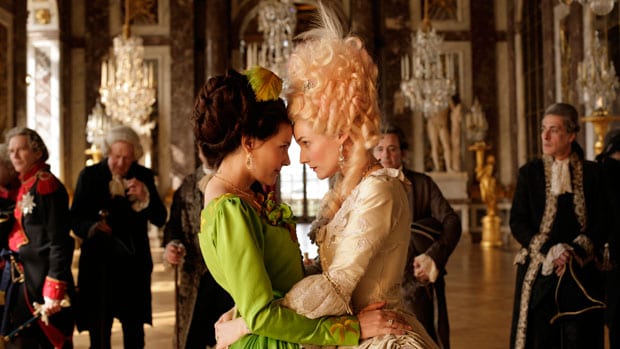Marie Antoinette indulges in something other than cake in ‘Farewell, My Queen’

OFF WITH HER HEAD | The French queen Marie Antoinette (Diane Kruger, above right) flirts with other women, causing a scandal, in the beautiful but ultimately superficial period drama ‘Farewell, My Queen.’
ARNOLD WAYNE JONES | Life+Style Editor
The historic line on Marie Antoinette, the Austrian royal who became the last queen of France, before losing her head after the revolution, is that she was so frivolous, pampered and detached from her subjects, she couldn’t even tell they were starving. (“Let them eat cake!” she famously declared.) The new film Farewell, My Queen does little to dispel the idea of Marie (Diane Kruger) as flighty and self-centered, but what it does show is a woman of strong sexual energy. And it’s not all directed at King Louis.
 Director Benoit Jacquot wastes no time in portraying the queen as flirtatious toward her handmaid, Sidonie (Lea Seydoux); it’s not 10 minutes in before Marie has snuggled up next to her, their breath heating each other so much even the frigid aristocrats who see them are scandalized by the sexual tension.
Director Benoit Jacquot wastes no time in portraying the queen as flirtatious toward her handmaid, Sidonie (Lea Seydoux); it’s not 10 minutes in before Marie has snuggled up next to her, their breath heating each other so much even the frigid aristocrats who see them are scandalized by the sexual tension.
But her servant isn’t the only one; rumors fly about a lady at court, Mdme. Polignac (Virginie Ledoyen) is also carrying on an affair. Is Marie a predatory lesbian or merely the object or suspicion and gossip, merely a superficial flirt with attention deficit?
Jacquot and his co-screenwriters begin the film late in the life on the monarchy — long after the murmurs about Marie and Polignac had become common knowledge — at a time when the queen was on the brink of being marginalized. The story is really told from the perspective of the impressionable but quickly wise Sidonie, who seemingly has the trust of everyone from the sexy gondolier to powerful royals. Through her, we interact not only with Marie Antoinette in her chambers, but the people in the streets (and in the candle-lit halls of the palace) and the entire French Revolution.
Jacquot’s suggestive sexuality is soon eclipsed by the day’s politics; it all plays out amid the rich, Vermeer-like lighting and glowing earth tones. Still, it plods along with characters engaged in up-against-the-wall sex that it look as if they were designed for the covers of the bodice-ripper pulp fiction for which they were named. It’s like Downton Abbey in French.
And yet, not nearly as good as that TV show. Its beauty and the uniqueness of the insights into the queen aside — and despite a strong performance by Kruger — the pacing and structure are derivative from almost every period film set in an era when women wore hoop-skirts and men dressed in white stockings. Indeed, few films since Dangerous Liaisons have come close to capturing the intensity and energy of the era. Liaisons itself was exceptionally racy, too … and that was almost 25 years ago.
I can’t help but feel that if the story of Farewell, My Queen started earlier, and could have been developed outside the insanity of the revolution, it might have shown more insights into the nature of Marie Antoinette’s personal life. Ultimately, it’s as shallow as we have come to feel about the queen herself, where surfaces mean too much.
This article appeared in the Dallas Voice print edition August 3, 2012.

